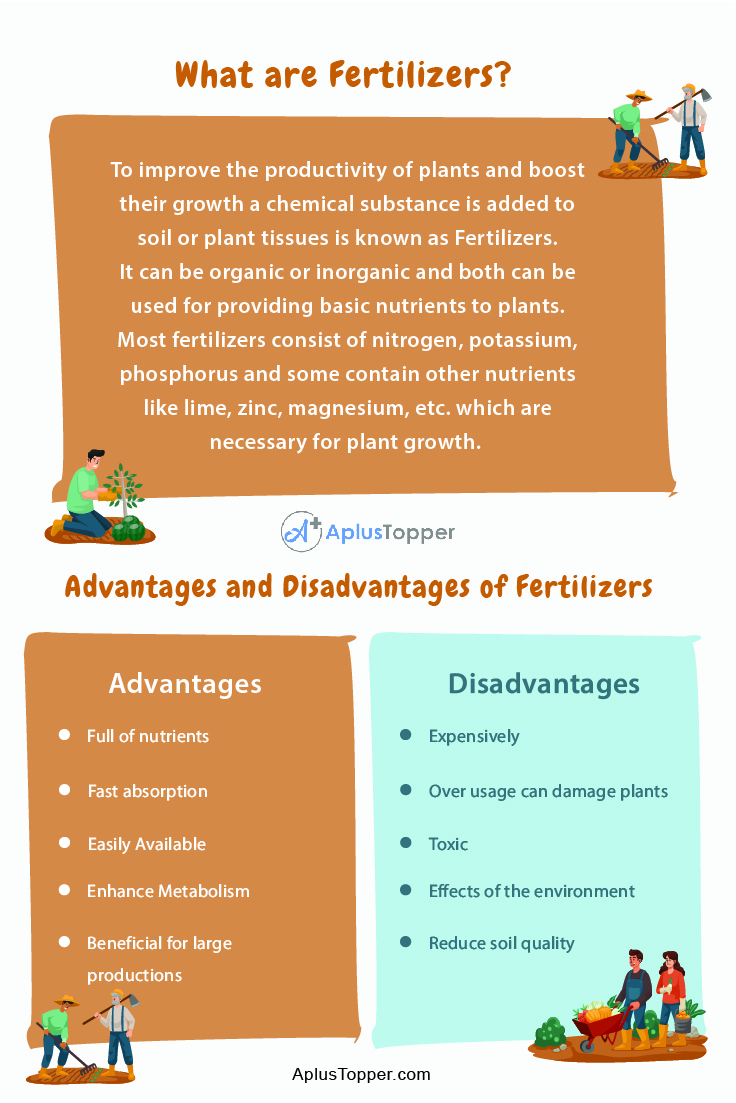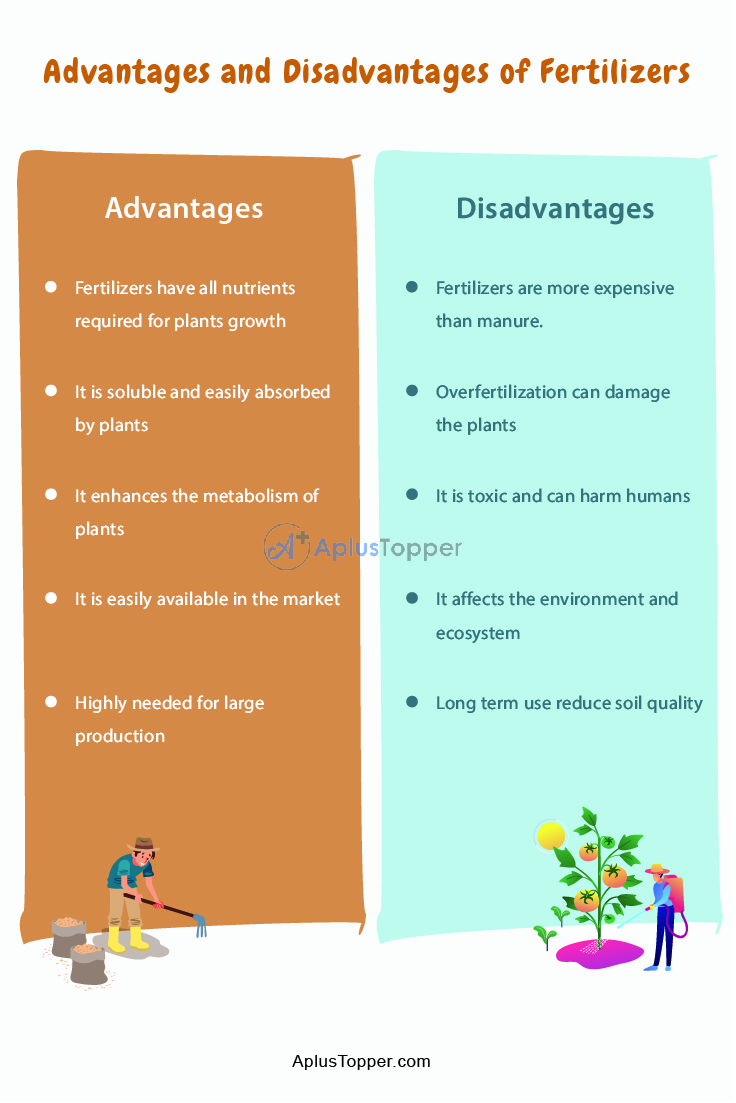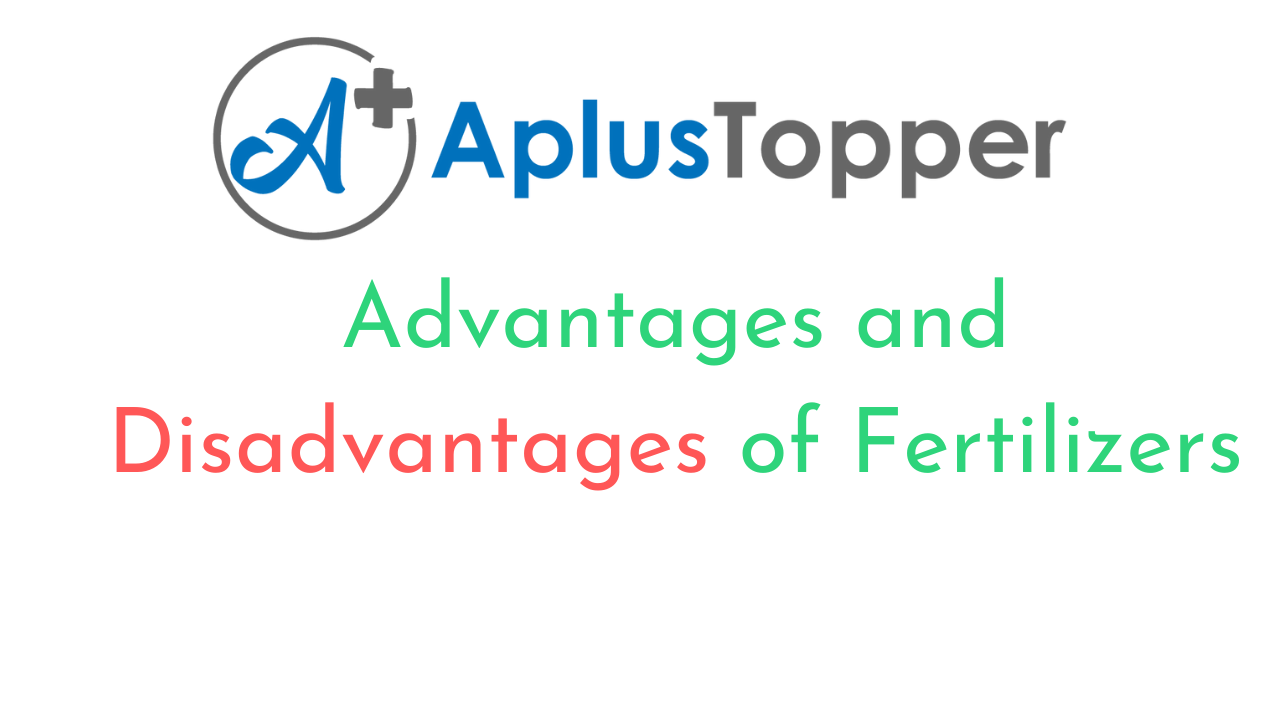Advantages and Disadvantages of Fertilizers: Like other living beings plants also need some nutrients for their proper growth and development. Sometimes it becomes difficult to get all the elements from soil naturally then we have to use fertilizers that can be organic or inorganic but helpful to boost the plant’s health and its growth. But fertilizers have their benefits and drawbacks. Let us discuss more:
Students can also find more Advantages and Disadvantages articles on events, persons, sports, technology, and many more.
What are Fertilizers? Advantages and Disadvantages of Fertilizers 2022
To improve the productivity of plants and boost their growth a chemical substance is added to soil or plant tissues is known as Fertilizers. It can be organic or inorganic and both can be used for providing basic nutrients to plants. Most fertilizers consist of nitrogen, potassium, phosphorus and some contain other nutrients like lime, zinc, magnesium, etc. which are necessary for plant growth. It is beneficial for agricultural production. so basically three types of fertilizers are commonly used;
- Chemical
- Organic
- biofertilizers
Chemical fertilizers: The macronutrients nitrogen, phosphorus, and potassium are mainly present in chemical or inorganic fertilizers. This chemical fertilizer is mostly used because it is easily soluble and boosts the growth of the crop instantly.
Organic fertilizers: Organic fertilizers are mainly made by elements that occur in nature or end product of natural material. Like most of the other fertilizers, it also provides basic nutrients of the plant which are potassium, nitrogen, and phosphorus. Organic fertilizers increase a lot of soil organisms which helps to boost plant growth.
Biofertilizers: Microbial inoculants or biofertilizers help fix the soil elements by non-usable to usable form through the biological process. These fertilizers are microorganisms like bacteria, algae, and fungi which help in fixing the soil atmosphere and convert potassium phosphate into a soluble form so that soil can absorb it to boost plants.
- Advantages of Fertilizers
- Disadvantages of Fertilizers
- Comparison Table for Advantages and Disadvantages of Fertilizers
- FAQ’s on Pros and Cons of Fertilizers
Fertilizers come with some advantages and a few disadvantages .let us discuss its advantages:
Advantages of Fertilizers
Full of nutrients: All three types of fertilizers provide important nutrients to the plants which are helpful in the growth of plants and crops. Potassium, nitrogen, phosphorus are basic elements to boost the yield which is easily provided by all fertilizers in different ways. Chemical fertilizers are made artificially and it has fast production but it boosts quickly the plants so it is used widely whereas organic fertilizers are made by natural process and take time to be prepared but they are good for plants also gives all the necessary nutrient to the plant without harming the nature and human .bio fertilizers are also made by a natural process so it takes time to be processed but it helps soil to fix its problems naturally and convert it into efficient for plants. So in any form fertilizers are the main ingredient of plants that help them to grow properly.
Fast absorption: Sometimes plants need a quick fix to survive, in this type of cases fertilizers play a vital role to improve plants’ health. plants need nutrients that can be absorbed quickly which is fulfilled by fertilizers. They are easily soluble and fastly absorbed by plants and as soon as possible it helps to regain and boost plant health.
Easily Available: As the fertilizers are very helpful in fast improvement in plants and best for agricultural production its demand also increases but many factories are working constantly to reach the demand. Thus now all the types of fertilizers are easily available in the market.
Enhance Metabolism: Fertilizers are food for plants that promote their growth. It can only be possible when a proper metabolic activity is processed. Fertilizers are easily digestible by plants and thus increase their metabolism rate to enhance plant growth.
Beneficial for large productions: As the population is increasing, there is a huge demand for food, so good yield is required to fulfill the demand. Here fertilizers become helpful for the good production of crops due to their numerous benefits which promote the fast and healthy growth of plants. For large production, fertilizers become compulsory.
Let us discuss some Disadvantages of Fertilizers:
Disadvantages of Fertilizers
Expensively: Fertilizers are man-made so they need production in factories which makes them costlier than naturally made manure. But it is important for plant nutrients so it is in demand and thus it has high value.
Over usage can damage plants: Fertilizers are used in moderate quantities if we use excessive fertilizers it surely damages the roots of plants and their tissues and thus plants can die. fertilizers are used according to the need of the plant. Unnecessary use of them can affect the plant’s health specially if plants have good fertile soil.
Toxic: There are many types of fertilizers in the market, some of them are chemically made. These chemical fertilizers are harmful to humans and plants also. Skin irritation, respiratory problems commonly occur due to fertilizers. Can pass harmful chemical in our food which affects
Effects of the environment: Indirect or indirect ways fertilizers are affecting the environment. by soil pollution, groundwater pollution and also can affect the growth of plants by faster growth instead of normal. It can affect the ecosystem.
Reduce soil quality: fertilizers can reduce the quality of soil and can harm microorganisms in the soil. Long-term use disturbs the pH of the soil and also reduces the microbial activities which are naturally good for plants.

Comparison Table for Advantages and Disadvantages of Fertilizers
| Advantages of fertilizers | Disadvantages of fertilizers |
| Fertilizers have all nutrients required for plants growth | Fertilizers are more expensive than manure. |
| It is soluble and easily absorbed by plants | Overfertilization can damage the plants |
| It enhances the metabolism of plants | It is toxic and can harm humans |
| It is easily available in the market | It affects the environment and ecosystem |
| Highly needed for large production | Long term use reduce soil quality |

FAQ’s on Pros and Cons of Fertilizers
Question 1.
What are Fertilizers and their types?
Answer:
Fertilizers are materials that are used to boost plant growth and increase crop production. It provides the basic nutrients to plants like nitrogen, potassium, phosphorus that are very much needed by the plants for their proper nourishment.
There are two types of fertilizers generally used that are organic and inorganic or chemical fertilizers. Both are used for providing plants with basic requirements of nutrients.
Question 2.
What are organic fertilizers with some examples?
Answer:
organic fertilizers are naturally made fertilizers that are made with the elements that are found in nature or are the end product of natural elements. Some of the examples of organic fertilizers are compost, compost tea, fish and seaweed emulsions, vermicompost, bone meal, soybean meal, etc.
Question 3.
What are the disadvantages of chemical fertilizers?
Answer:
Chemical fertilizers affect the soil quality by reducing its pH value and microorganism that are present in the soil which helps in improving the fertility of soil naturally.
